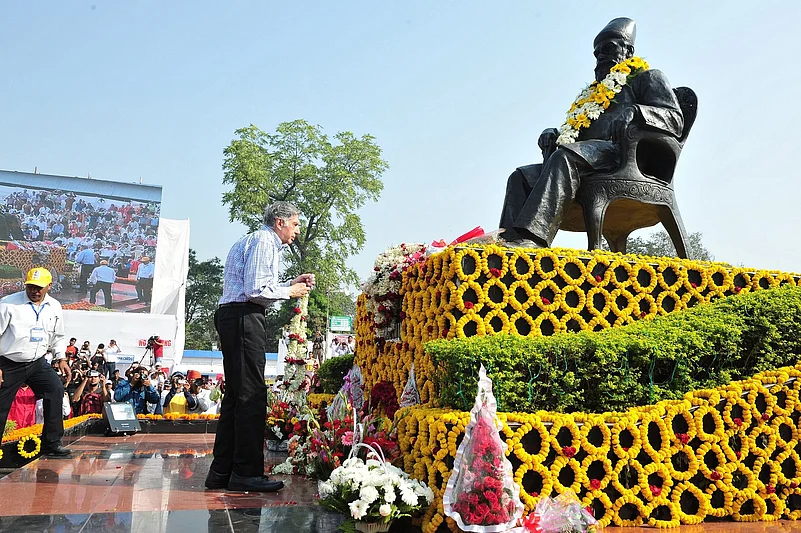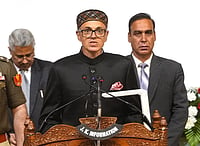March 3 is Founder’s Day in Jamshedpur and Ratan Tata never missed the occasion. The citizens of the city say that the 86-year-old industrialists would attend, ignore his security guards who would advise him to maintain his distance, and personally greet everyone at the festivities. “If you couldn’t meet him on March 3, then he would make sure to give you time on March 4— it didn’t matter if you were the Chairman of Tata Steel, or a housewife, or a child,” they recall.
Tatanagar, The City That Is A Testament To Ratan Tata’s Vision
Jamshedpur, or Tatanagar, is a testament to Ratan Tata’s vision, humility, and respect for human values, says the city’s residents and the group’s former employees.

The news of Tata’s demise late night on October 9 has caused the city to stop in the middle of its Pujo festivities to commiserate the passing of a man they call, “The People’s Industrialist.”
“When he visited Jamshedpur, he would visit every corner of the city to make sure it was all up to the mark,” says Ashok Tomar, who worked as former Tata Steel Chairperson Rustomji Homusji Mody’s personal assistant for 15 years, and has known Tata since the latter started working in his family’s steel plant as a General Trainee in the early 1960s.
Tomar remembers Tata as being shy and a “man who measured his words.” He adds, “He could speak very eloquently if given a topic. But he was not one to offer unsolicited views.” However, he stresses that this did not stop the industrialist from making time for his employee— “be it a chairman or a chaprasi.”
Tata was interested in all aspects of Jamshedpur. Tomar remembers a Founder’s Day when JRD Tata, Ratan Tata and Rustomji Mody were present for the function. “That was when he (Ratan Tata) started his career from Tata Steel Jamshedpur, he tried to understand the system, he even wanted to know about the canteen services, medical services, every nook and cranny interested him,” said Tomar.
Jamshedpur is also called Tatanagar by its residents and Steel City around the world, was founded in 1912 by Jamshedji Tata. The city, now the largest in Jharkhand, was the site of Asia's first steel plant, and considered the home of the Tata Group.
It was under Ratan Tata's leadership that Jamshedpur really transformed. After he became chairman of Tata Steel in 1993, the industrialist continued the legacy of Jamsetji Tata, the group's founder, and expanded the family business. This brought international recognition to Jamshedpur. The city was one of India's first planned industrial towns.

Prabhat Sharma, who headed Corporate Communications at Tata Steel Jamshedpur, Kalinganagar, and more for over 30-35 years, recalls Tata’s “respect for human values.” He says, “you felt respected in the company; how Big Boss (Ratan Tata) would never ever treat anyone like they were some junior. Even after post-retirement, I can still get facetime with seniors in the company, and this respect comes from Tata and carries through generations.”
Sharma, who settled in Jamshedpur after he retired, recalls that a Tata Steel meeting in the city in which he spent days with the industrialist. “There was Mr Manjrekar who had worked with Mr Tata when he had been a trainee at the plant, and he saw his man across the room and got up from his chair and went over to him to receive Manjrekar.” This display of humility, says Sharma, is part of Jamshedpur’s core values.
Tata's commitment to Jamshedpur went beyond profit, says Tomar. "Ratan Tata never compromised on the city's facilities; company profits or otherwise," he adds.
Upon taking over, Tata revamped the Meherbai Tata Memorial Hospital, which provides cancer care to patients in the region. He also built a hockey academy in the city to encourage young and local talent. Apart from these, Tata was iconic for his love of dogs, and Jamshedpur has one of India's top Kennel Clubs which regularly hosts dog shows and also takes care of the city's strays.
Tata, himself, learned to pilot an aircraft in Jamshedpur's airplane club, taking lessons alongside his employees.
Sharma points out that, unlike many parts of India, Jamshedpur has not witnessed any communal violence since the 1980s, and has been a melting pot of different regions of India. He gives the credit for this to Tata's values and vision.
"People here are employed, and if they are young then there are facilities for them to be engaged and take an active role in the society. If a man is employed and living with respect and engaged in the community, why would he riot?" he says.
Former Hindustan Times Resident Editor Vijay Murthy was born in and reported from Jamshedpur for decades. Murthy’s grandfather and father both worked in Tata companies.
“We are not a big city like Delhi or Mumbai; we don’t have metros and all these things, you will not find a skyscraper here, but this is a green, peaceful city with many outdoor areas for people, every place is only 15 minutes away, and there are all kinds of clubs and facilities that keep people happy and busy,” he says
Murthy says that he always finds time to visit his hometown, and gives Tata the credit for planning and maintaining the city. “There is no traffic here, we have people from all around India, all faiths, and everyone’s religion is respected here, we celebrate together,” he says, adding that the city is an “anti-thesis” to the rest of India.
Sharma says, “I term JN Tata as a Founder, Doraji Tata as an implementor, JRD Tata was where our values came from, and Ratan Tata was the Transformer—he transformed the group but somehow kept the values intact in the company and in the city.”
- Previous Story
 J&K New Govt: Five Ministers Join UT's First Cabinet As CM Omar Abdullah Assumes Office
J&K New Govt: Five Ministers Join UT's First Cabinet As CM Omar Abdullah Assumes Office - Next Story





















